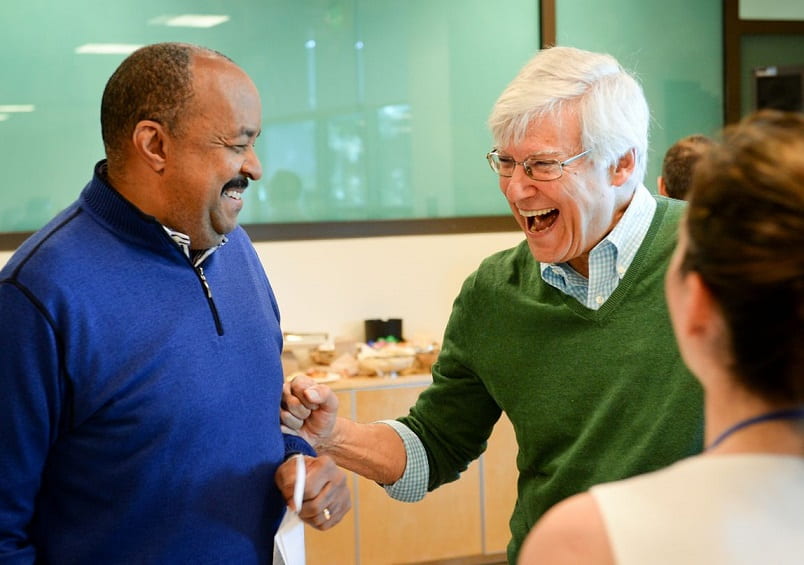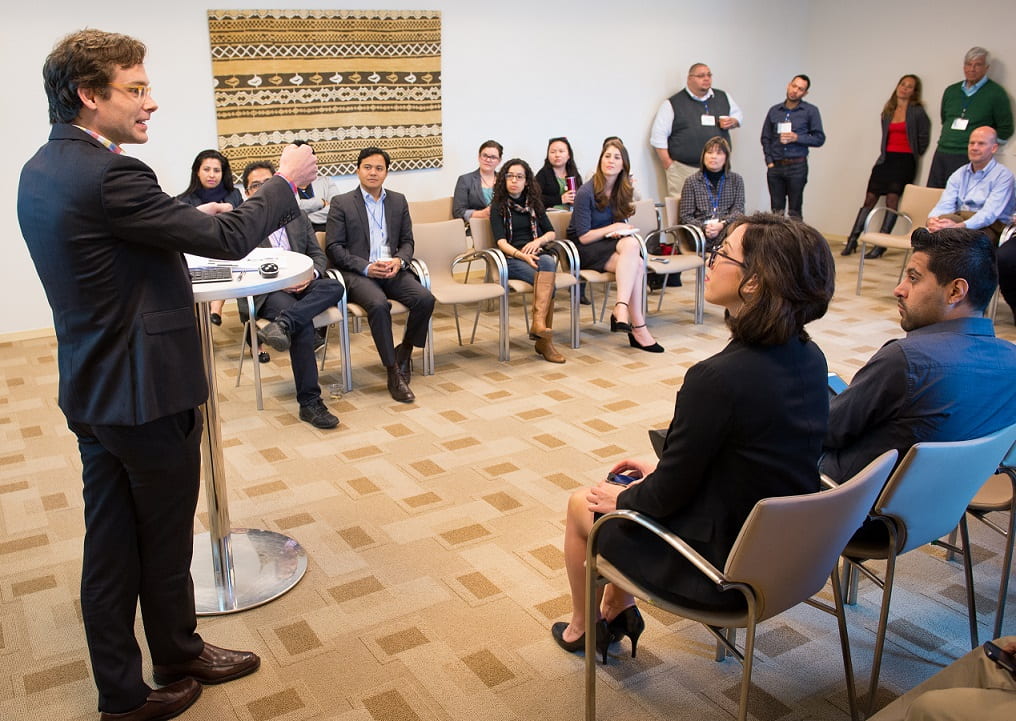In partnership with The California Endowment, the USC Annenberg Center on Communication Leadership & Policy hosted the Get Mobile Forum on April 2nd, a conference that brought together local community organizations to explore how mobile technology can empower communities and increase civic engagement.
Watch videos of each presentation and see more event photos at the Get Mobile Forum website.

Jerlene Tatum from EYCEJ shakes hands with Mari Lopez from Vision y Compromiso, Inc.
Over thirty invitees attended the forum on Wednesday, April 2 at The California Endowment for a day packed with presentations, Q&A sessions, mobile app demos and networking opportunities.
Dr. Robert K. Ross, President and CEO of The California Endowment, introduced the conference by stressing the importance of finding practical solutions. “It’s not about the next killer app,” Dr. Ross said. “The problem is not a lack of innovation… It’s when something works, how do we scale it in a sense that a community can benefit from it in a meaningful way?”
CCLP Director Geoffrey Cowan agreed with Dr. Ross, adding that the Get Mobile Forum “is about empowering people to work together to make a difference in their own lives.”

Dr. Robert K. Ross and Professor Geoffrey Cowan share a laugh.
In keeping with that theme, speakers at the Get Mobile Forum focused not on technology itself, but on how technology can connect and empower communities, especially marginalized communities. Bill Moore, CEO of Zello, discussed his social radio app for smart phones, which was blocked by Venezuela’s government-owned internet service provider in February 2014 when protesters were using the app to coordinate movements and distribute information. The walkie-talkie app Zello, which lets users broadcast to as many as hundreds of thousands of listeners, also became a top app in Turkey, Egypt, and Ukraine.
Jed Alpert, CEO of Mobile Commons, shared several case studies of text messaging campaigns that successfully reached out to target audiences, including a live support system created by Planned Parenthood that allowed teens to ask for and receive health advice through text messages.
Throughout the Get Mobile Forum, speakers highlighted the easily-overlooked benefits of low-tech solutions. Remember: as Benjamin Stokes, co-founder of Games for Change, phrased it, “Even paper is technology!” Dr. Shelly Farnham from Microsoft Research Fuse Labs found in a 2013 study that when it comes to discussing local community issues, youths rely on email and face-to-face communication more than social media. “Text messaging is the most effective method for reaching everyone, especially the underserved,” said Jed Alpert, highlighting in his presentation that 90% of text messages are read by recipients.
At the end of every presentation, CCLP research director Mark Latonero moderated a Q&A session, encouraging community organizers to discuss how they could apply the new strategies and technologies to their organization’s specific needs.
Attendees represented organizations including Participant Media, California Calls, Labor Community Strategy Center, Asian Americans Advancing Justice LA, and more.
Learning how to use apps and tech to bring about social change! #GetMobileForum pic.twitter.com/RNotXSo8Fi
— Community Coalition (@CoCoSouthLA) April 2, 2014
Professor Gabriel Kahn, Director of the Future of Journalism at the USC Annenberg Innovation Lab, presented Crisis Connection, a smart phone app created to help people coordinate resources and document issues during a disaster. After launching a news bureau in Italy and struggling to improve disaster coverage, Kahn says, “what I really needed was to empower citizens to help start reporting in a sensible way about what they were seeing in a disaster.” The crowd-sourced notes can be viewed on a map, helping emergency responders and news correspondents understand a disaster’s impact across a community.
But there was one problem. After creating their prototype, Kahn says his team realized that “nobody really wants to download an app just for disasters.” To give the app broader appeal, Kahn and his team are working to transform Crisis Connection into a community organizing tool. He encouraged participants at the Get Mobile Forum to get in touch with him and collaborate on using technology to meet the specific needs of local communities.
Benjamin Stokes, co-founder of Games for Change, discussed social games like Macon Money, which encouraged players to visit new businesses in the city of Macon, Georgia. Of the players who visited a new business while playing the game, 92% reported that they returned to those new businesses later on, according to a report from the Knight Foundation.

Benjamin Stokes, Co-founder of Games for Change, Discusses Games and Mobile Civics
While some speakers focused on how technology can forge new connections within a community, others shared how analyzing existing connections can help organizations better understand their communities. Dr. Andrés Monroy-Hernández from Microsoft Research Fuse Labs shared his research on using network algorithms to analyze the use of Twitter for crisis reporting in Mexico, identifying influential community members who spend as many as 15 hours per day reporting on local events.
Professor Dana Chinn, a media analytics strategist at the USC Annenberg Norman Lear Center Media Impact Project, compared targeted metrics to what she humorously called the “spray and pray” mass media model of outreach, which targets a broad audience and only measures “who shows up”, not who engages with or cares about an issue. Chinn advised that before data analytics can offer any benefit, organizations first need to clearly define “the change you want” and “the people you want the change to come from.” Christine Albert from Civis Analytics explained how randomized, controlled experiments and predictive modeling can identify the best ways to reach specific communities and inspire a target audience to take action, whether the goal is to increase voter turnout or identify people at risk for diabetes.
#GetMobileForum is great. My inner #nonprofittech geek is full as a tick. @CalEndow @ZeroDivideorg pic.twitter.com/lmRp8gnCPn
— M. Rubio (@ZDRubio) April 2, 2014
At lunch, CCLP staff demonstrated five mobile apps on smart phones, tablets and laptops, answering questions and working with event organizers to find new ways their organizations could take advantage of the many free apps available. Apps included VolunteerMatch, a platform that makes it easier for volunteers to connect with nonprofits; CitySourced, a civic engagement platform that lets residents report local issues like potholes directly to a city’s work order management system; and Meporter, a citizen journalism app that lets users report and curate real-time, hyperlocal news.
Gabriel Shapiro from USC Annenberg CCLP Demonstrates CitySourced
Attendees left the Get Mobile Forum excited to try new technologies and begin new partnerships. “It was a great opportunity to network with other organizations,” wrote one attendee in our feedback survey. “I feel empowered to explore new routes for implementation for these tools.”
Following the Get Mobile Forum, USC Annenberg CCLP will publish a report on the latest strategies and best practices for engaging communities through mobile technology.
